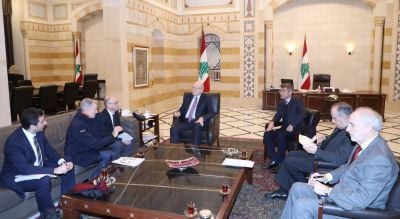French Diplomat Pierre Duquesne in a meeting with caretaker Prime Minister Najib Mikati. (Credit: Mikati's media office)
BEIRUT — Pierre Duquesne, the French diplomat tasked with coordinating international aid to Lebanon, said Thursday from the Grand Serail that he will visit the US to discuss sparing Lebanon from Caesar sanctions in implementing Jordanian and Egyptian energy deals.
The US Caesar act imposes sanctions on anyone dealing with Bashar al-Assad's Syrian regime. Electricity and gas obtained via the deals must pass through Syrian territory, presenting sanctions risks.
Duquesne began a two-day visit to Lebanon Thursday "as part of a mission for France to support the recovery of the Lebanese energy sector and follow up on the Egyptian and Jordanian energy deals," according to a press release from the French embassy.
This visit to Beirut follows a trip to Egypt and Jordan.
During a meeting with caretaker Prime Minister Najib Mikati, Duquesne said that he will visit the US "within two weeks to discuss with American authorities the ways to spare [Lebanon's] electricity file from the Caesar law which allows helping Lebanon to resolve the energy crisis."
Lebanon's state-run Électricité du Liban provides precious few hours of power per day, forcing most Lebanese to rely on expensive private generators or solar panels. Duquesne said he is also visiting Egypt and Jordan "to try to help Lebanon's electricity sector."
Lebanon has signed two energy deals with Jordan and Egypt in which the two countries would help Lebanon obtain electricity and gas. The potential deals are both part of a US initiative to help Lebanon in its electricity crisis and are to be funded by a loan from the World Bank. Syria is a partner in both deals as the imports pass through its territory, posing risks of sanctions on Lebanon in accordance with the Caesar act.
Duquesne also affirmed the "importance of implementing the two demands from the World Bank in order to help Lebanon's electricity sector which is auditing bills and starting to form a regulatory body for [EDL's] electricity."
The two demands mentioned by Duquesne have yet to be implemented by EDL and the Energy Ministry. Other demands, such as increased electricity tariffs, have already been implemented.
In his meeting Thursday, Duquesne also urged Lebanese authorities to implement the reforms demanded by the International Monetary Fund "which to France and the international community represents the main pathway to restore Lebanon's economy and receive support beyond what is expected from the IMF."
"This deal strengthens international trust in Lebanon and its institutions and the work of the government," he also said. In 2022, Lebanon signed a preliminary deal with the IMF under which it has to implement reforms in return for a $3 billion loan. These reforms are yet to be implemented. More money is expected to be given to Lebanon if its signs a deal with the IMF.
In the afternoon, the diplomat also met with caretaker Energy Minister Walid Fayad, with whom he returned to the above-mentioned energy agreements and to whom he reaffirmed that he would do everything possible "to overcome the obstacles" to their implementation, according to a statement issued by the ministry concerned after their meeting.
For his part, the Lebanese minister said he had provided Duquesne with "all the documents" proving "the enormous work done by the ministry … in compliance with the conditions of the World Bank."
Later that evening, the diplomat met with caretaker Finance Minister Youssef Khalil.
